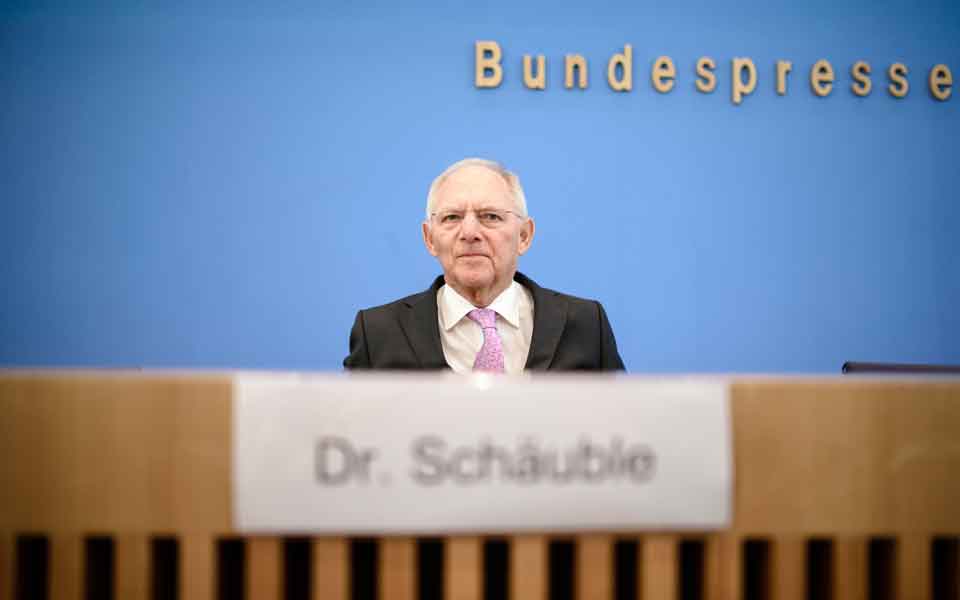Schaeuble, Greece and the Sisyphean task

There was no celebratory mood in Athens as the news filtered through last week that Wolfgang Schaeuble is set to move aside as finance minister after eight years in the job. The switch in Schaeuble’s political career comes as Greece remains under a program and with Athens prioritizing getting out of the bailout next year. The country’s relationship with the irascible German politician is not a matter of urgency.
Schaeuble took up his position in October 2009, just as the full extent of Greece’s fiscal derailment was becoming clear. The 75-year-old leaves the post with Athens a few months away from exiting what everyone is hoping will be its final program. Schaeuble’s legacy will be forever linked to the bewildering crisis that began in Greece and spread to other parts of the eurozone, before concluding right back where it started.
Given that he first became an MP in 1972, Schaeuble has shown tremendous political stamina. After surviving an assassination attempt in 1990, he has also displayed personal resilience, returning to work almost straight away and playing a key role in the German reunification process.
As finance minister from 2009, he and his eurozone colleagues had the immense task of responding to a crisis the likes of which Europe had never seen before: Sovereigns using the nascent European single currency at risk of default. The response prevented defaults that would have caused severe economic damage, but the approach chosen created much bitterness.
The response isolated the problem in the countries in question, particularly Greece, while shielding the eurozone core, and its banks, from damage. However, it placed a huge burden of adjustment on the program countries – one which has left deep scars.
Germany was in the driving seat due to its burgeoning economic power and was able to shape the way that the euro area dealt with the problem. Influenced by “ordoliberalism” (the theory that the state should regulate markets so they are as competitive as possible) prevalent in German economic thinking and constrained by Chancellor Angela Merkel’s piecemeal approach to decision-making, Berlin led the eurozone on a stop-start journey over the last eight years. Schaeuble, a constitutional lawyer who saw developments through his – and the German government’s – rules-based prism when it came to European affairs, appeared content with this approach.
In his first joint press conference with Yanis Varoufakis in 2015, Schaeuble borrowed Johann Wolfgang von Goethe’s saying that “if everyone sweeps in front of his own door, the whole world will be clean.” It encapsulated his belief that despite being part of a common currency, each member-state was responsible for cleaning up its own mess. Burden-sharing through debt mutualization, for instance, was seen as the road to ruin.
This approach, though, left many Greeks perplexed and angry. Beyond the populist attacks and the caricatures, they struggled to understand why a common currency could not provide common solutions. Why couldn’t Greece, for instance, be given more time to put its finances in order so the impact on the economy and people’s lives was not so damaging? Why couldn’t some of its debt be written off so the country could have a chance to make a new start? Why couldn’t the European Central Bank, which had done so much to save the euro following Mario Draghi’s “whatever it takes” comment in 2012, buy Greek bonds as well as everyone else’s?
These are difficult questions with complex answers but they lie at the heart of why Schaeuble and the line he spearheaded caused so much resentment in Greece.
As Greeks survey the landscape now the German finance minister is due to leave his role, they can take heart from the fact that public finances are now much healthier but they cannot ignore that their economy has been wrecked. They also cannot forget that Schaeuble’s response to the complaints about the damage being done was to the single currency’s exit door.
They also look upon a single currency that has managed to weather the storm but which has done little to address the concerns which have surfaced in Greece and other program countries over the last few years.
Perhaps the strongest criticism that Greeks can level at Schaeuble is not to do with the state of their country, where local politicians must also take some of the blame, but that Greece’s fate (economic depression, political instability, social unrest and intra-European animosity) has not prompted more radical changes within the single currency to prevent such devastating crises in the future.
Fifteen French and German economists, including Henrik Enderlein and Jean Pisani-Ferry, co-authored an opinion piece last week expressing concern about the “significant fragilities” within the eurozone. Seeking to piggyback on the debate that has been initiated by French President Emmanuel Macron, they argued that the stabilization of the eurozone has relied too much on the ECB, that some countries’ banking systems continue to be overexposed to sovereign debt and that the tools for promoting sound policies in member-states are not effective enough.
The economists also highlight “deep divisions” in the way that their two countries view how to move forward. For example, Macron is proposing a hefty euro area budget to cushion the impact of crisis and augment investment, while Berlin is more focused on creating the European monetary fund to be the single currency’s main crisis management tool.
The experts warn of the consequences of Paris and Berlin making a “small bargain.” “It would not make the euro area more stable,” they write. “It would not address the fundamental causes of why fiscal rules have not worked well,” they add, calling on the German and French governments to find a balance between market discipline and risk-sharing.
As Schaeuble seemingly heads for a new role as parliamentary speaker, the fact that the euro area is still struggling to grasp many of the challenges it faced when he arrived at the Finance Ministry and Greece discovered it was on the verge of bankruptcy seems a damning indictment of the last eight years.
It is said that Schaeuble has compared himself in the past to Sisyphus, the king from Greek mythology who was forced to roll a boulder up a hill for eternity. This is something that Greeks could sympathize with given the rebuilding that their country needs after such a long depression and the work that needs to be done within the eurozone.
The outgoing finance minister, though, suggested one should imagine that Sisyphus was happy because he never questioned his task. It is unlikely Schaeuble and the Greeks will ever see eye to eye.





